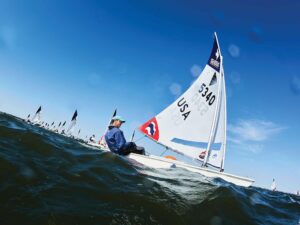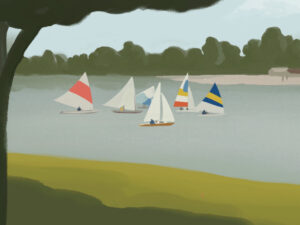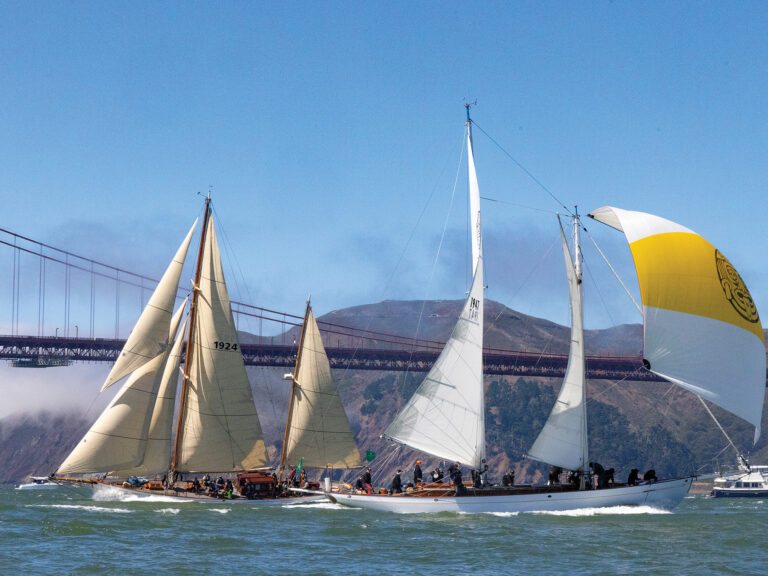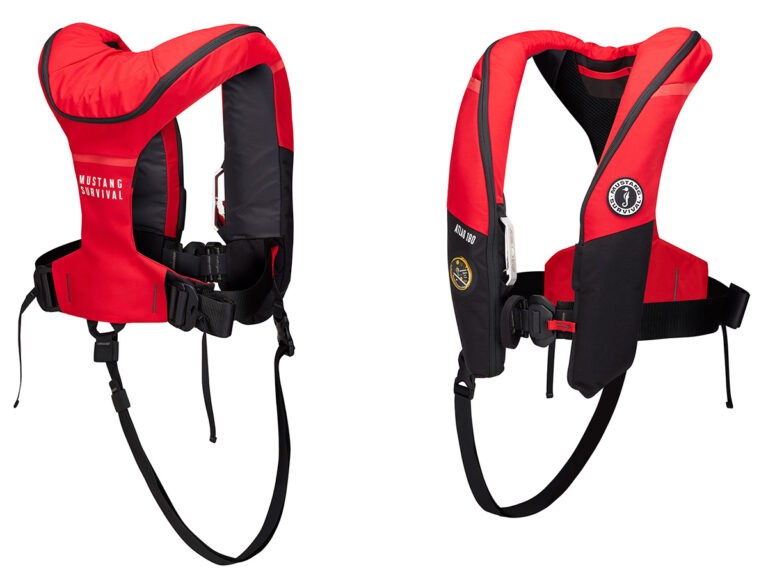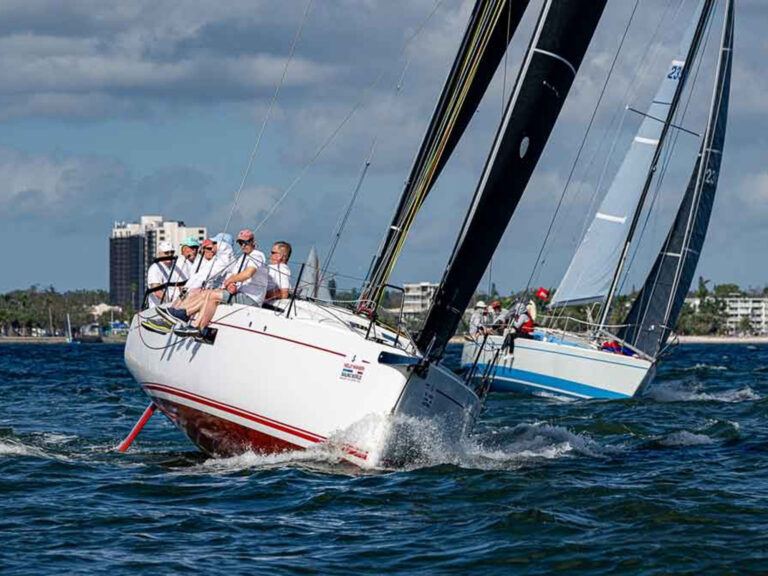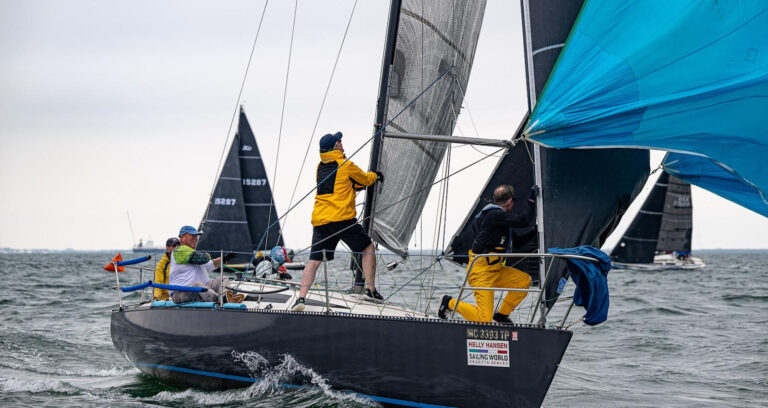
The Olympic Regatta is right around the corner and many athletes are making the final push for berths and funds, including the US Sailing Team’s Louisa Nordstrom and Trevor Bornarth, Olympic 470 hopefuls. This campaign update from their latest newsletter reveals the challenges and rewards of the campaign life and the importance for passing the GoFundMe basket.
Wind, waves, and sunshine. What more could a sailor ask for? As we hoisted sails and launched our boat in the clear blue waters on the island of Mallorca, I couldn’t help but smile. It was a long road for us to get here, especially this year.
Our team had faced some significant challenges. Our biggest sponsor throughout our Olympic 470 campaign shifted strategies…and after our test event qualifiers ended in February, Trevor and I were left with no equipment and no funding to continue with our campaign. This put us in a tough position considering we are less than a year out from our Olympic trials and we pretty much needed to restart our campaign from scratch. It made us reconsider everything. Why are we doing this? Is it worth it? Is it possible? Our final conclusion. Yes. We are all in.
Luckily with the bit of money Trevor and I could scrape up between the two of us, we managed to get possession of a boat, and pack it up and put it in a container in time to make it to Palma.
So, Trevor and I got to work, harder than ever to restructure and reframe our campaign. We knew we never wanted to be put in this position again, and so a big priority for us going forward is to have complete ownership of our campaign at all levels. Luckily with the bit of money Trevor and I could scrape up between the two of us, we managed to get possession of a boat, and pack it up and put it in a container in time to make it to Palma. We had no sails and the boat was missing a lot of pieces… but we knew we could figure it out. That was the motto. We’ll figure it out.
In March after shipping the only 470 equipment we owned in a container from Miami to Barcelona, we had no equipment to train on and were forced to get creative. While we scoured Miami to assemble a 470 to use, we did some coaching, trained and competed in other sailboat classes, and continued to work hard in the gym. What we thought would be a period of no sailing turned into a lot of hours on the water, learning from a different perspective from what we have been used to these past two years.
Louisa got some foiling time in the Waszps at the American Magic training base in Pensacola, and also competed in the Etchells class for the first time and finished in third place overall at the Etchells Midwinters. Trevor finished fourth driving at the Snipe Midwinters in Key Largo with his sister Katie, and was chosen as one of a select few coaches to train the top youth teams at the legendary CISA clinic. There is so much to learn in the sport of sailing, and we’ve both appreciated the time we’ve had to explore different avenues of the sport and bring it back to the 470. I think this time has been really valuable to us and allowed us to see the sport of sailing through a different lens.
Thanks to the help of many friends and mentors, we were able to get a boat pieced together to train with in Miami and managed to get 10 days on the water in the beginning of March training with the US 470 squad before heading off to Palma for the Princess Sofia Regatta. Stu McNay, Nikki Barnes, Dave Hughes, and Lara Dallman-Weis helped us get a boat together to practice with and after this productive training block, we shipped it over to the Spanish island of Mallorca for some more training before the start of the event.
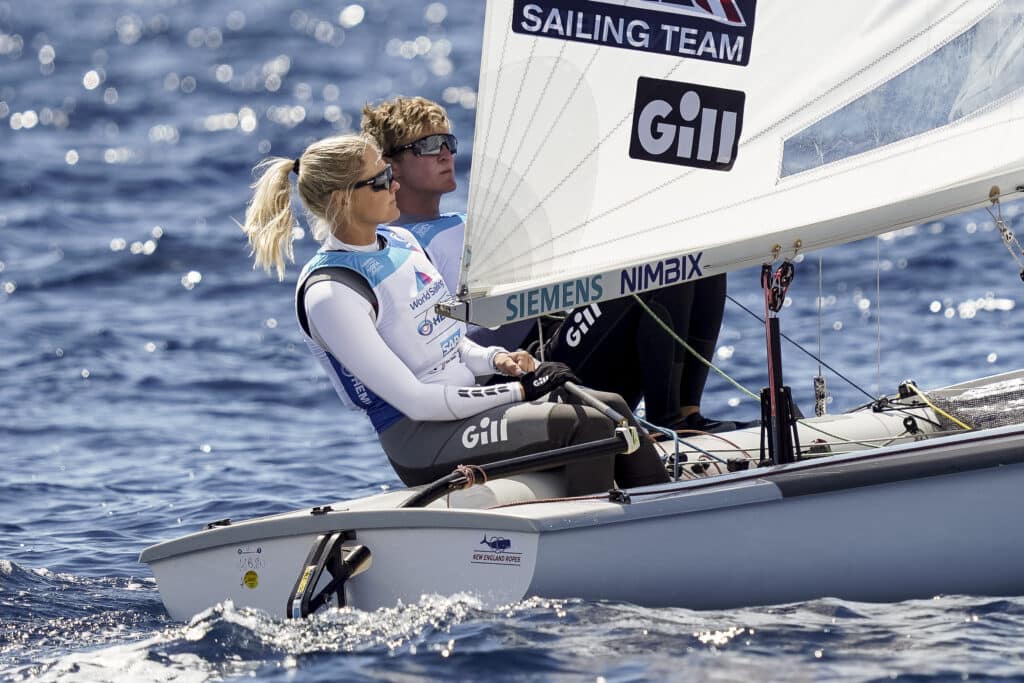
Once we arrived in Palma we had quite a lot of work ahead of us to get the boat race ready. We spent the first few days practically living at the boat park doing repairs, replacing parts, and getting the boat tuned to our liking. We had no tool box when we first arrived, but thanks to our friends in the 470 fleet we were able to scavenge the correct tools to get the job done. It’s a beautiful thing in the sailing world. You travel around to all of these events, training and competing against the same people. Some of your biggest competition turns into some of your closest friends, and fortunately for us, our friends really came through for us to help us get our ship up to speed. After countless hours giving our boat love she deserves, our beautiful vessel, Lisa, was ready to go.
At this year’s 52nd Princess Sofia Regatta there were a record number of boats in comparison to previous years. Seventy-two boats, split into two fleets for five days of racing, plus a medal race. The conditions this year were spectacular, especially when compared to last year’s blistering cold and stormy conditions. Sunny clear blue skies and a consistent sea breeze for practically every day of training leading up to the event. Couldn’t ask for much more. Unfortunately, this didn’t carry into the first day of the event, and we spent most of the day postponed, starting some racing and abandoning them shortly after. The real first day of racing was Day 2 of the event, and we started off strong. A decent start tacking off to the right early with a consistent right shift throughout the beat. Rounded the top mark in third and picked off a few boats throughout the race to finish in first. It was a great feeling. This was what we were working toward. All the struggle to get to this event was worth it for moments like this.
We scraped by well enough to get ourselves into gold fleet where we got some great quality racing. One highlight was leading a gold fleet race until the final downwind where we got a yellow flag penalty on the last downwind leg of the race.
Unfortunately, we weren’t able to match that going into the following races. We struggled to get off the starting line and played things too conservatively. The next day we strung along a similar series of races. We had great speed, but we didn’t give ourselves enough opportunities in the race by holding ourselves back at the start. We scraped by well enough to get ourselves into gold fleet where we got some great quality racing. One highlight was leading a gold fleet race until the final downwind where we got a yellow flag penalty on the last downwind leg of the race. Some highs and some lows. It’s impressive to see how the level of sailing in the fleet is picking up as we get closer and closer to the Olympics. The caliber of the fleet this year as compared to last year is significantly different. A lot of great lessons learned when up against such great opponents, it definitely highlights your weak spots quickly.
We finished up the event in 22nd overall. We’ve already started another training block and it’s been great to approach training with new goals and areas for improvement based on this event. We are so glad the pieces fell into place to allow us to go and compete in this event. It was such a great experience to go and compete with our new mindset and campaign setup, squeezing every ounce of value from each day with our coach Steve Keen and our quality training partners Stu McNay and Lara Dallman-Weis. We’re pushing the level of 470 sailing in the United States together. Coming up are the 470 European Championships in San Remo, Italy (May 12-20), Coaches regattas and training – Marseille, France (the Olympic venue), domestic training in Newport, Rhode Island in prep for Worlds (July), and the Allianz Sailing World Championship – The Hague, Netherlands (August 10-20).

